 Petzlover
Petzlover Istarski Ostrodlaki Gonic is originated from Croatia but Spitz is originated from Russia. Istarski Ostrodlaki Gonic may grow 10 cm / 3 inches shorter than Spitz. Istarski Ostrodlaki Gonic may weigh 13 kg / 28 pounds lesser than Spitz. Istarski Ostrodlaki Gonic may live 4 years less than Spitz. Istarski Ostrodlaki Gonic may have less litter size than Spitz. Istarski Ostrodlaki Gonic requires Low Maintenance. But Spitz requires Moderate Maintenance
Istarski Ostrodlaki Gonic is originated from Croatia but Spitz is originated from Russia. Istarski Ostrodlaki Gonic may grow 10 cm / 3 inches shorter than Spitz. Istarski Ostrodlaki Gonic may weigh 13 kg / 28 pounds lesser than Spitz. Istarski Ostrodlaki Gonic may live 4 years less than Spitz. Istarski Ostrodlaki Gonic may have less litter size than Spitz. Istarski Ostrodlaki Gonic requires Low Maintenance. But Spitz requires Moderate Maintenance
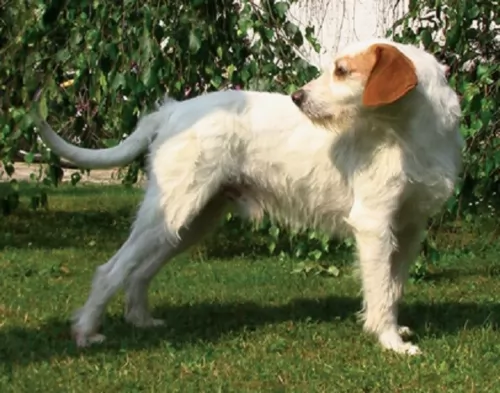 The Istarski Ostrodlaki Gonic, also referred to as the Istrian wire-haired or short-haired scenthound is a very ancient dog breed. Apparently the dog has been found in paintings that go way back to the early 1700s.
The Istarski Ostrodlaki Gonic, also referred to as the Istrian wire-haired or short-haired scenthound is a very ancient dog breed. Apparently the dog has been found in paintings that go way back to the early 1700s.
The dog can either have a short, smooth coat or a rough, wiry longer coat. He has always been popular with hunters, used for hunting rabbits and fox.
An interesting fact with this dog is the correlation between the Dalmatian dog and the Istrian short-haired hound. According to veterinary investigations, there are strong likenesses between the two breeds.
The truth is, the origin of the Istrian has been a matter of dispute for some time but in 2003 the Federation Cynologique Internationale recognized the breed as hailing from Croatia.
 A spitz is not a breed of dog, but rather a “group or family” of dogs that has its roots in Germany. Within this family there are a variety of breeds that were bred for very specific purposes by people in many different parts of the world. The spitz family can be toy dog size up to vey large. Examples run from the Pomeranian to the Canadian Eskimo Dog.
A spitz is not a breed of dog, but rather a “group or family” of dogs that has its roots in Germany. Within this family there are a variety of breeds that were bred for very specific purposes by people in many different parts of the world. The spitz family can be toy dog size up to vey large. Examples run from the Pomeranian to the Canadian Eskimo Dog.
The Spitz family dogs share the look of thick, long fur and pointed muzzles, ears and curly tail. Despite their German name, they are thought to originally be of East Asia or Artic descent. Most of today’s spitz are from Siberia’s Artic region, first described in 1788 and in English in 1792. Spitz have been bred for three types of jobs depending upon where they were developed. These jobs included pulling, herding and hunting.
There are very powerful and large Spitz breeds that pull or hunt large game. Examples of these breeds are the Swedish Elkhound, the Akita Inu, the Norwegian Elkhound and the Karelian Bear Dog. The smaller sized breeds like the Samoyed hunted small mammals and birds, while the Finnish Lapphund, Lapponian Herder, and Swedish Lapphund herded, hunted and pulled small sleds.
The three largest spitz also pulled sleds throughout the 17th and 18th centuries. In most places the Canadian Eskimo Dog, the Alakan Malamute and the Greenland dog were used in sled racing and fur trapping while in Canada and Alaska the Siberian Husky was used for the same things.
Recently there have been genetic tests that show a large number of dogs that are considered Spitz type so share many strong ancestral ties and DNA similarities with wild wolves. It is now believed that a lot of these breeds were intentionally mated with wolves and some were accidental. Both domestic and wild dogs are included in this history.
Most spitz are made for cold weather, even today’s lapdogs, like the Pomeranian, do not do well in hot climates.
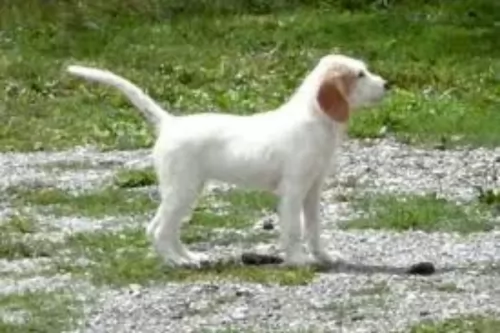 Medium in size, the Istarski Ostrodlaki Gonic stands at roughly 43 to 60cm at the withers and weighs roughly 12 to 27kg. The chest of the dog is broad and deep, the skull slightly rounded while the muzzle is strong and rectangular shaped. The nose is dark brown or black.
Medium in size, the Istarski Ostrodlaki Gonic stands at roughly 43 to 60cm at the withers and weighs roughly 12 to 27kg. The chest of the dog is broad and deep, the skull slightly rounded while the muzzle is strong and rectangular shaped. The nose is dark brown or black.
The ears are floppy and are nearly always in the orange color while the tail is long and is carried low. The coat of the rough haired dog is of medium length. In fact the coat can either be short and smooth or longish and wiry with a woolly undercoat. The color of the coat is white with orange markings.
This breed of dog is sought after for his cheerful personality. He is loyal to his human family and is a social dog, loving to spend time around his family.
He is energetic, confident and strong-willed and this is why, as with most other dogs, he will benefit from training and socialization, as this makes him obedient and responsive to his owner. He is evenly tempered, being gentle and docile.
 Most of the spitz breeds share a “look” that includes erect ears, stocky heavy, usually double coats, a pointed muzzle, thick, fluffy ruffs and a heavy curled tail carried high over the body. Build for northern climates they are insulated by a undercoat that is waterproof and dense and a less dense topcoat. Their ears are small to prevent frostbite and their paws have thick fur to protect them in the frigid, icy terrain.
Most of the spitz breeds share a “look” that includes erect ears, stocky heavy, usually double coats, a pointed muzzle, thick, fluffy ruffs and a heavy curled tail carried high over the body. Build for northern climates they are insulated by a undercoat that is waterproof and dense and a less dense topcoat. Their ears are small to prevent frostbite and their paws have thick fur to protect them in the frigid, icy terrain.
Many still have wolf-like looks and tendencies. Some are very difficult to train to be companions – the Akita, Chow and especially the Karelian Bear Dog – fall into this category. Many mixed breed dogs are also considered members of the Spitz family. These dogs are easy to recognize as spitz because of these physical characteristics
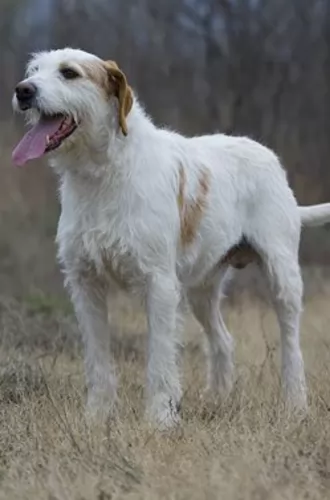 The Istrian Wire-haired Scenthound or Istarski Ostrodlaki Gonic as he is also referred to is a strong, well built hound which is elegant in appearance.
The Istrian Wire-haired Scenthound or Istarski Ostrodlaki Gonic as he is also referred to is a strong, well built hound which is elegant in appearance.
He has a remarkably striking coat - bright white with orange markings. He has always been an excellent hunting dog, even to this day. This background hunting of his will require that he receives ongoing exercise as well as mental stimulation.
Treat this beautiful dog well - exercise him, groom him, feed him well and love him and you will be rewarded with the loyal and devoted friendship of an amazing dog.
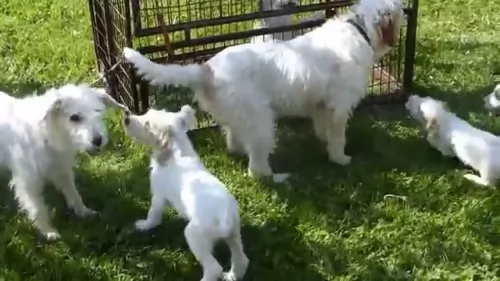 There are people who don’t take dental disease seriously in dogs as they think that it simply affects the teeth, when in fact dental disease can affect the dog’s entire body.
There are people who don’t take dental disease seriously in dogs as they think that it simply affects the teeth, when in fact dental disease can affect the dog’s entire body.
Dental- and gum disease is to be regarded with concern as it can be painful and even life threatening. It affects many dogs, and unfortunately your Istarski is also likely to have problems with his teeth. Tartar build-up and infection of the gums can lead to tooth loss but also damage to the kidneys, heart and joints.
Dogs need to have their teeth attended to regularly and if this is something new to you, speak to your vet and find out about special canine toothpaste and toothbrush and how to use them.
Dogs can be susceptible to bacterial and viral infections such as rabies, distemper and parvo, and that is why visits to your vet are so important. These life-threatening diseases for your Istarski Ostrodlaki Gonic are preventable through vaccinations.
 It is a little harder to characterize the health issues of a family of dogs than it is a .will overheat in hot climates due to their double coats. Here are some propensities of dogs in the Spitz family.
It is a little harder to characterize the health issues of a family of dogs than it is a .will overheat in hot climates due to their double coats. Here are some propensities of dogs in the Spitz family.
• Thrombopathia bleeding disorder with the risk of a hemorrhage, platets don’t clot.
• Larger breeds are affected by Elbow and Hip dysplasia that can cause arthritis and lameness.
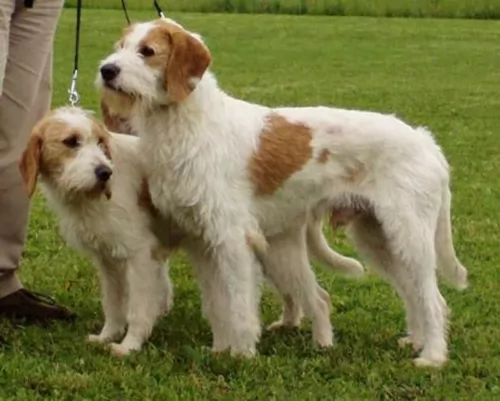 Taking care of an Istarski Ostrodlaki Gonic dog is much like caring for a child – doing everything you can to keep him healthy and happy, after all, he is a member of your family.
Taking care of an Istarski Ostrodlaki Gonic dog is much like caring for a child – doing everything you can to keep him healthy and happy, after all, he is a member of your family.
You want to be watching his diet and making sure that it is the best quality there is, full of vitamins and minerals to keep his eyes bright, his nose wet and his tail wagging.
There are excellent commercially manufactured dog foods on the market today and the best ones ensure excellent nutrition for your dog to keep him in optimal condition through each stage that he goes through. Try to include some home-made food into this kibble such as cooked chicken, brown rice and vegetables and it can be to his benefit to just to include some raw meat from time to time.
Make sure your Istarski Ostrodlaki Gonic is well exercised, that you check his teeth and ears to ensure there are no infections and to call the vet immediately you suspect something is wrong. Make sure you have him examined as a puppy and that he gets his necessary injections as there are diseases that can kill your dog.
 1Feeding the puppy The Spitz family has high energy needs but in a slow-release so they need protein more than grain. Puppies should be fed 3-4x a day in small meals. Don’t overfeed them.
1Feeding the puppy The Spitz family has high energy needs but in a slow-release so they need protein more than grain. Puppies should be fed 3-4x a day in small meals. Don’t overfeed them.
2.Feeding the adult – The Spitz type dog stores their energy to use in extended periods when working or playing. They will become obese if overfed or if they don’t get enough exercise. Feed 2-3X a day in small or medium sized meals, even the larger breeds because of their storage of calories.
4. Games and Exercises – Having been bred for endurance and stamina most Spritz breed need plenty of exercise, lots of space and lots of play. They love to run, jog, or play games. They are outdoors types who love to hike, and run or walk for long times over long distances. They are great in cold, wet weather but not so good in the heat. How much exercise they need depends on the size and history of the specific breeds. Most love to play with other dogs, so dog parks and dog day care can both be good choices for most of them. Agility, barnhunt, field trials, pulling games are all good choices.